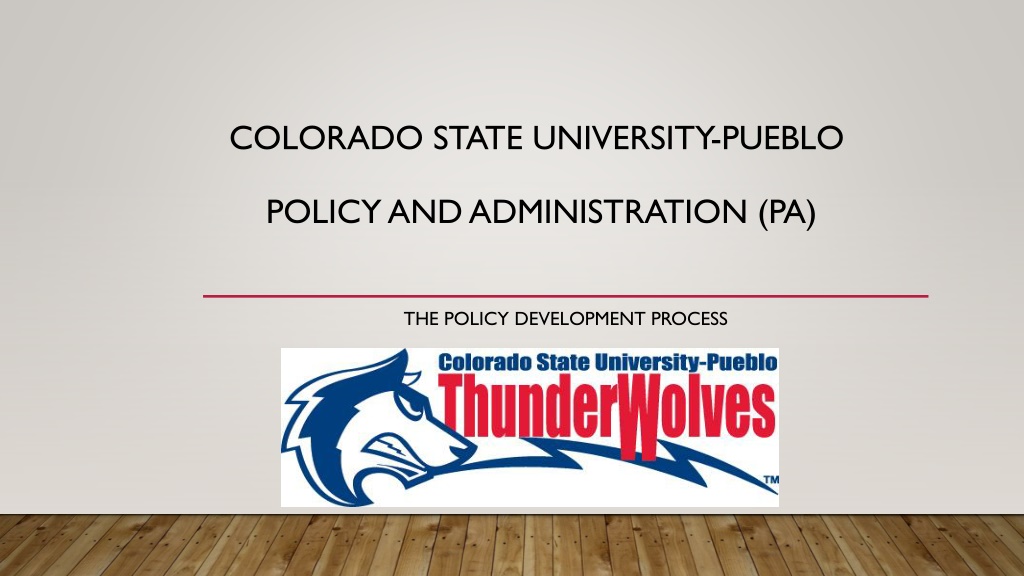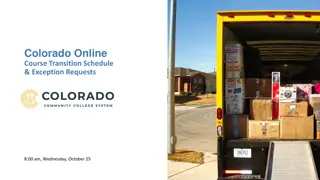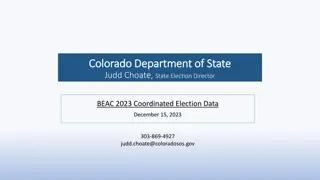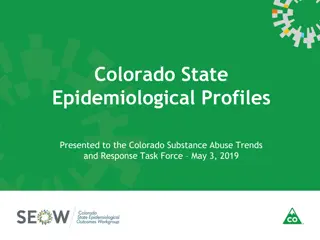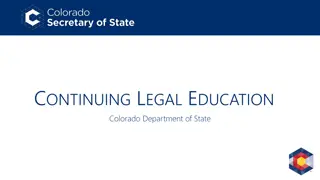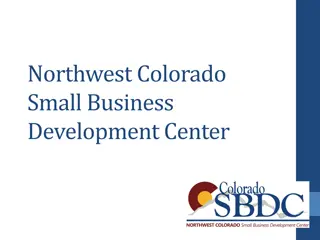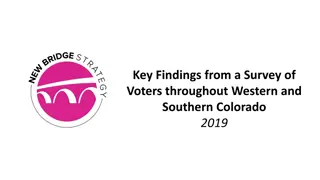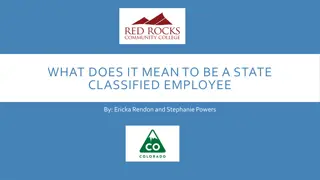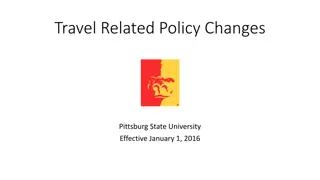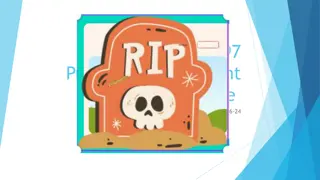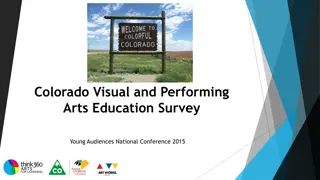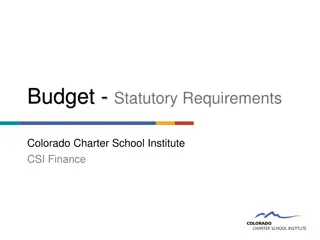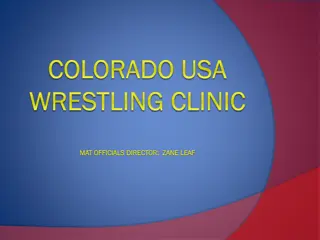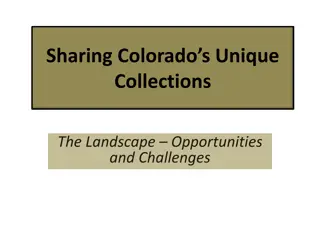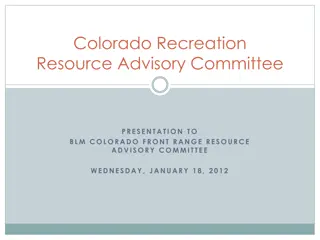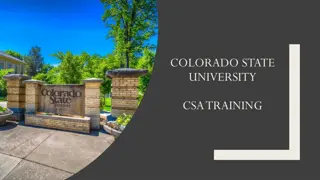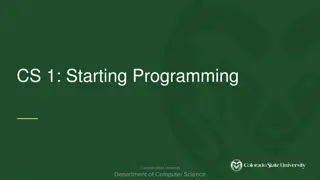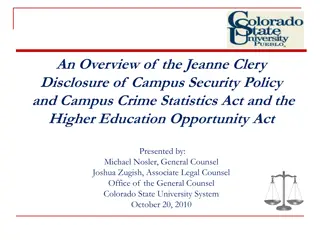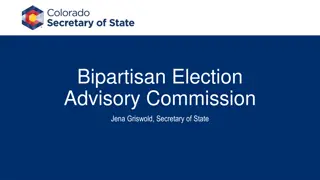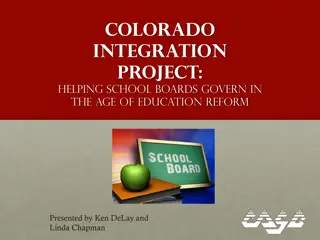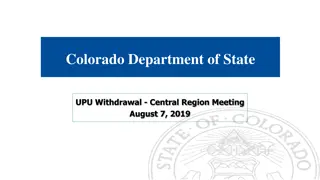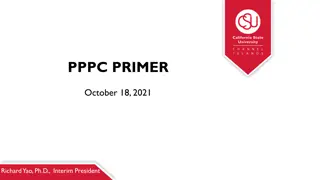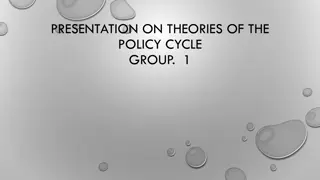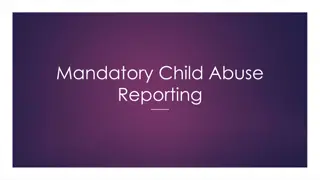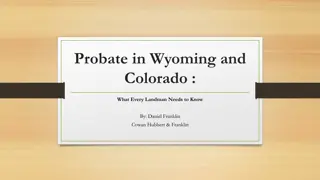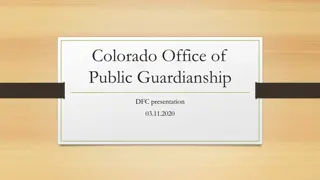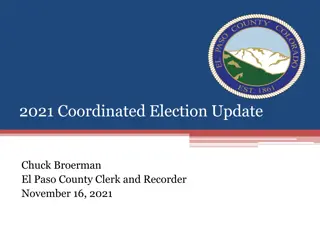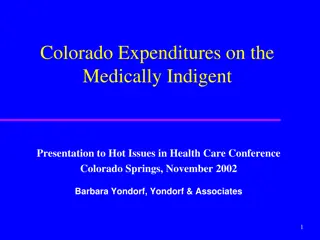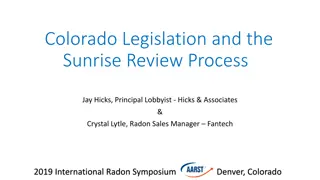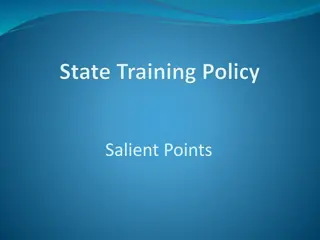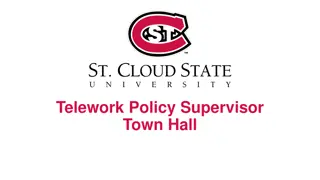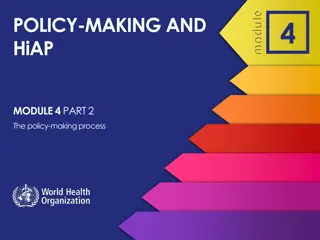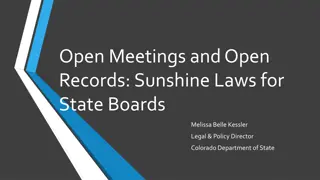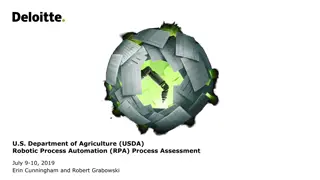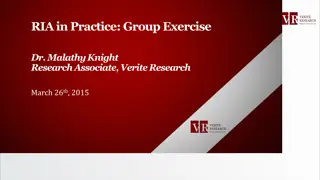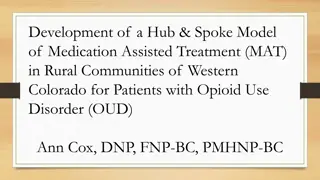Policy Development Process at Colorado State University-Pueblo
Colorado State University-Pueblo follows a structured Policy Development Process involving proposal, development, and approval stages. The process includes creating policy proposals, obtaining approval from the President's Cabinet, and collaborating with stakeholders to develop and finalize policies. Various steps such as researching, drafting, and legal review are conducted to ensure comprehensive policy development.
- Policy Development
- Colorado State University
- Administration
- Proposal Process
- Stakeholder Collaboration
Download Presentation

Please find below an Image/Link to download the presentation.
The content on the website is provided AS IS for your information and personal use only. It may not be sold, licensed, or shared on other websites without obtaining consent from the author. Download presentation by click this link. If you encounter any issues during the download, it is possible that the publisher has removed the file from their server.
E N D
Presentation Transcript
COLORADO STATE UNIVERSITY-PUEBLO POLICY AND ADMINISTRATION (PA) THE POLICY DEVELOPMENT PROCESS
CREATING UNIVERSITY POLICIES PHASE 1: PROPOSAL, DEVELOPMENT AND APPROVAL Green Light University Cabinet Proposal Proposal/Impact Statement To OGC/PA Proponent Executive Sponsor Stakeholder Input/Working Group Begin Development Of Procedures Policy Under Development Development Draft Legal Review Final Policy Cabinet President Approval
STEP 1: THE PROPOSAL PROPOSE A NEW POLICY OR REVISE A CURRENT POLICY The Proponent may be any campus unit or constituent with an interest in changing university policy. At least one member of the President's Cabinet who supports the proposal must serve as Executive Sponsor. The Proponent notifies the Office of General Counsel (OGC)/Office of Policy Administration (PA) of the desire to propose a new policy or revise a current policy. The Proponent works with OGC/PA to draft a Policy Proposal/Impact Statement ("proposal"). The proposal provides background and justification for the proposed policy, plus an analysis of the impacts that the new or revised policy will have on the campus community and the resources required to adopt, implement, monitor and enforce it. A Policy Owner is assigned. Usually this is the same as the Proponent, but not always. The Policy Owner is the department or official who will be responsible for implementation, monitoring, enforcement, and updating throughout the life of the policy.
Policy Proposal/Impact statement Form https://www.csupueblo.edu/general-counsel/forms.html
GETTING THE GREEN LIGHT The Executive Sponsor presents the proposal to the President's Cabinet. Cabinet may require further information, may determine that the policy proposal should not be advanced, or may approve the proposal to move forward for policy development.
STEP 2: DEVELOPMENT STAGE RESEARCH, DRAFT AND EDIT OGC/AP and the Proponent/Policy Owner(s) work together throughout the entire drafting and editing process. Oftentimes, a policy working group will be formed with representatives of stakeholder groups and subject matter experts. Develop the guidelines, procedures and all necessary forms that are required to implement the policy. OGC/AP will research the laws, regulations and existing policies that impact the proposed measure and will assist in drafting the policy document. After initial legal review by OGC, the draft will then be presented to the stakeholder for any input.
STAKEHOLDER INPUT REVIEW AND COMMENT University stakeholder input is sought during this stage. Stakeholders include anyone identified in the proposal/impact statement, as well as anyone that may have been identified by the Cabinet as a stakeholder whose review and comment is required. The proposal and the policy draft are posted to the Policies Under Development page on the OGC website, open to the public for anyone to review and submit comments. If significant changes result from stakeholder or other input, we will review the changes with the stakeholders, the Executive Sponsor, and OGC/PA as appropriate.
STEP 3: APPROVAL The final policy document is presented to Cabinet by the Executive Sponsor. If Cabinet approves it, a recommendation will be made to the President to adopt the policy. If necessary, the Cabinet may also request changes or additional information before making its recommendations. The President may approve the policy. His signature constitutes approval of the policy
PHASE 2: IMPLEMENTATION Educate Communicate Develop The new/revised policy to the campus community Guidelines, procedures and forms as necessary to implement the policy The campus on the business processes for enforcing, monitoring and reporting as required for compliance
STEP 1: COMMUNICATE The new/revised policy and all necessary forms will be announced to the campus community. The policy is published in the Policy Library which can be found: http://csu-pueblo-policies.colostate.edu/
STEP 2: DEVELOP Develop guidelines and procedures to implement the policy. Create forms that are necessary within the standards of the policy. Establish internal controls
STEP 3: EDUCATE The campus will be trained on the processes for enforcing, monitoring and reporting as required for compliance. OGC/PA, along with the responsible department, and other units such as Human Resources, may assist.
PHASE 3: MONITORING AND ENFORCEMENT After implementation, it may be necessary to monitor compliance with the policy and note any problems that arise as a result of its implementation. This is primarily the responsibility of the Proponent, though other compliance officials may be involved. The policy is enforced through the "internal controls" identified in the proposal and policy documents. Campus units must comply with any reporting requirements contained in the policy. Internal Audit, Business & Financial Services, or other units may be charged with responsibility to periodically audit compliance.
FINAL PHASE: REVIEW Policies change over time. Changes to laws and regulations, best practices, and the campus community must be considered periodically. OGC/PA will remind Policy Owners of their responsibilities to review policies in their areas on a periodic basis (usually 1, 2 or 3 years). The Policy Owner is responsible for periodically reviewing the policy. Any changes will be handled in the same way as a new policy; often they can be fast-tracked.
FAST TRACK -ONLY USED WITH EXISTING POLICIES- Revisions to existing policies may be accomplished using fast-track. Fast-track policies do not require Cabinet approval (although they may be presented there as information items) Sometimes, a revision of an existing policy doesn t warrant the use of resources for the full development, approval and communications processes that otherwise would apply. The Executive Sponsor and the VP of the area must agree on using the fast track method. Signature authority is delegated by the President to the appropriate VP. All post-adoption steps are the same, including publication of the policy in the Policy Library.
EMERGENCY POLICY The University President and Cabinet can approve an interim policy in case of an emergency. An interim policy would have the same force and power of a regular policy except it is temporary and must include a sunset date within. This expedited policy process is to be used only to address an emergency or unforeseen situation that warrants such action until the normal policy adoption process can be completed in a reasonable amount of time.
POINTS OF CONTACT FOR ANY QUESTIONS Johnna Doyle Deputy General Counsel Colorado State University System 2200 Bonforte Blvd. Pueblo, CO 81001 Phone (719) 549.2130 E-mail: Johnna.Doyle@colostate.edu Cecil Kegans Executive Assistant to the Deputy General Counsel Colorado State University System 2200 Bonforte Blvd Pueblo, CO 81001 Phone (719) 549.2130 Email: cecil.Kegans@colostate.edu
